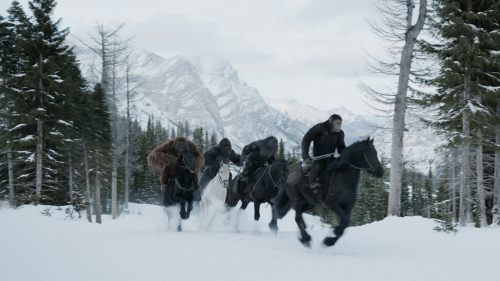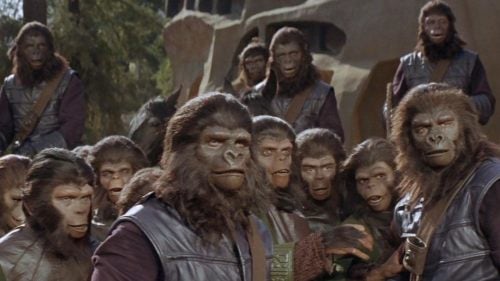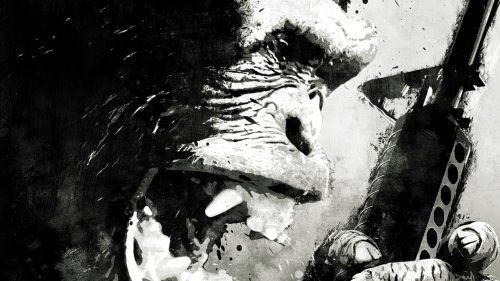The Badass Hall Of Fame: Caesar
Heads up: this spoils movies that are older than I am.
Even apes need a Moses. And that ape was Caesar. While the original Planet of the Apes is the most famous film in the five movie series, real fans of the franchise tend to be drawn towards Caesar, a complex and odd hero for a series that was, technically, aimed at children.
To understand the life of Caesar you have to know something about the chronology of the Planet of the Apes movies. By now everybody knows the twist ending of the first film, where Charlton Heston discovers he was on Earth all along, just Earth in the very distant future. At the end of the second movie, Beneath the Planet of the Apes, Heston actually blows up the whole world, seemingly putting an end to the series. But there were three more films, and the workaround was terrific: three apes from the future used Heston’s spaceship to travel back in time to 1973.
That’s the premise of Escape From the Planet of the Apes, which sees Zira and Cornelius, the hero apes of the first two films, become media celebrities… and a possible danger to humanity. They represent a future where humans are animals, experimented on and subjugated, and that freaks out the powers that be. They get even more freaked out when they discover that Zira brought back another passenger with her - she’s pregnant.
The baby is born as Milo, but like the infant Moses, Milo needs to be sent away to be saved. He grows up in the circus of Armando (played the great Ricardo Montalban). In Conquest of the Planet of the Apes we skip ahead to the then-futuristic 1991, where America has become a fascist state and where a plague has wiped out all the cats and dogs. Humans turn to apes as both pets and servants, abusing and dominating them. Milo, the only intelligent talking ape in the world, is horrified by the reality he sees, and when the state kills Armando, he renames himself Caesar, foments an ape revolution, and brings fire and death to the minions of Ape Control, who torture and imprison the apes.
Battle for the Planet of the Apes jumps ahead a number of years; after Caesar’s rebellion the human world fell into disarray and eventually nuclear war. Caesar’s very presence has jumpstarted the evolution of the other apes, and they live in a primitive town outside the radioactive wastes of the city. Humans live there in a tense co-existence; Caesar knows the future of the world where apes treat humans as humans treated apes, and he’s trying to change the history that is yet to come, but militaristic gorillas and radioactive human city dwellers put that desire for peace to the test.
What makes the Planet of the Apes films so brilliant (and the best science fiction franchise, for my money) is that each one uses the apes as a metaphor for society and race in a different way. In the first film they’re the dominant force in society, subjugating Charlton Heston, the epitome of the Great White Hero. The third film presents the apes as the minority who gets the attention of novelty, the science fiction equivalent of getting out of the ghetto as a basketball player or a musician. But if you stop being the enjoyable novelty, if you present a threat to the white hegemony, you are destroyed. Then in the fourth film the ape is the oppressed slave, and the film’s third act riots are consciously modeled on the Watts race riots of 1965.
In that ever changing landscape of metaphor Caesar takes on many meanings. He’s Moses, leading his people out of bondage, but he’s also Malcolm X, doing it by any means necessary. And like Malcolm X he ages from being a firebrand and a revolutionary to become someone trying to find a new path of peace - a change that turns his own followers against him.
Caesar is remarkable because he’s the main hero in a series of films that begin with the premise that apes will dominate man. Caesar, it turns out, is the engine of that domination, even if his very existence is a spit in the face of cause and effect. And yet we’re rooting for him every second of the way; his survival at the end of Escape is possibly meant to be ominous, but it really feels like a victory. And as he and his ape army rampage through the unnamed city, slaughtering humans it’s impossible not to feel a thrill. What makes Caesar so exceptional as a character is that his arc feels completely real, and that his evolution as it plays out across two and a half films is potent and honest and unflinching.
It helps that Roddy McDowell plays him. McDowell played Caesar’s father, Cornelius, in the first and third films (he couldn’t make it back for Beneath), and he has a natural kindness and sweetness of delivery. That’s especially true when he played Cornelius, a goofy scientist chimp whose honest quest for knowledge and understanding leads him (and his society) into some very bad places. By the end of Escape Cornelius has changed from an endearingly comedic character to an ape possessed by fury, gunning down federal agents, and that’s the first hint we got that McDowell could really do something remarkable under all that ape make-up. The change in Cornelius over the course of Escape feels like a dry run for Caesar.
There are two very different endings for Conquest of the Planet of the Apes. The one that made it into theaters was softened at the behest of the studio, and has Caesar pulling his troops back from the brink of massacring prisoners. But the original ending had Caesar raving about how the rebellion that began that day would travel to other cities, and then he has his group of gorillas savagely beat all the captured humans - apparently even Caesar’s friend MacDonald - to death with the butts of their rifles. It’s a really gruesome, chilling finale, and I have to say that I prefer the softened version somewhat. There’s no hope in this version of Caesar.
To me that hope is what makes Caesar so great. True revolutionaries use violence when needed, but they use it in service of finding peace and freedom. The original ending of Conquest is incredibly cynical, declaring that the new boss is just as bad as the old boss; with the softened ending the film’s statement is that the cycle of hate can be broken. But it doesn’t disavow violence, something too many bourgeois narratives do; movies enshrine revolutionaries who don’t disrupt the system too much, because movies are often tools of the system. Conquest never doubts that Caesar is right to raise his fist against the establishment, and even the softened ending is stronger than what you’d normally see.
Of course that hope is tested. There’s a weariness to Caesar in Battle that I like; while the rest of the film is often trash (it is, without doubt, the worst of the series), McDowell lets us see the weight on Caesar’s naturally stooped shoulders. It’s easier to create a revolution than to run a society.
“At the risk of seeming ridiculous, let me say that the true revolutionary is guided by a great feeling of love,” Che Guevara once said, and it’s rare to see cinematic revolutionaries depicted in the light of that love. What makes Caesar not only a great scifi movie protagonist but also one of cinema’s greatest revolutionaries is that his rage is motivated by his love for his fellow apes. While Caesar’s birth is shrouded in tragedy, he’s actually remarkably well-adjusted when he comes to town with Armando at the beginning of Conquest, but he’s unable to hold his tongue when he sees his own kind being savaged. What really sets him off, though, is the death of Armando, the human who was his father figure. I don’t know how much writer Paul Dehn had the entire series figured out when young Milo was given to Armando, but being raised by a good and decent human truly sets the stage for Caesar’s end of Conquest decision, and the way he tries to create a society where human and ape live side by side.
Does he succeed? Battle is vague on that matter. The last scene of the movie, set 600 years after the events of the film, does show human and ape going to school together, but it also shows a little boy ape pulling the hair of a little human girl; is this kids playing around or the sign of future violence? The question is underscored as the camera turns to a statue of Caesar, who cries a single tear of blood.
And now there’s a new Caesar. Fox’s attempt to restart the Apes series hits this summer, with Rise of the Planet of the Apes bringing a new spin to Conquest. Andy Serkis gives a motion captured performance as Caesar, an ape subjected to medical testing who develops an advanced intelligence and who eventually leads his brethren in a revolt in the streets of San Francisco. This Caesar doesn’t talk, though, and he’s certainly not a guy in a suit. Will this more simian Caesar have the same impact that Roddy McDowell’s classic revolutionary did?
This Sunday the Alamo Drafthouse in Austin is presenting a full day of Planet of the Apes madness, showing all five original films. I’ll be there! Click here to buy tickets.



